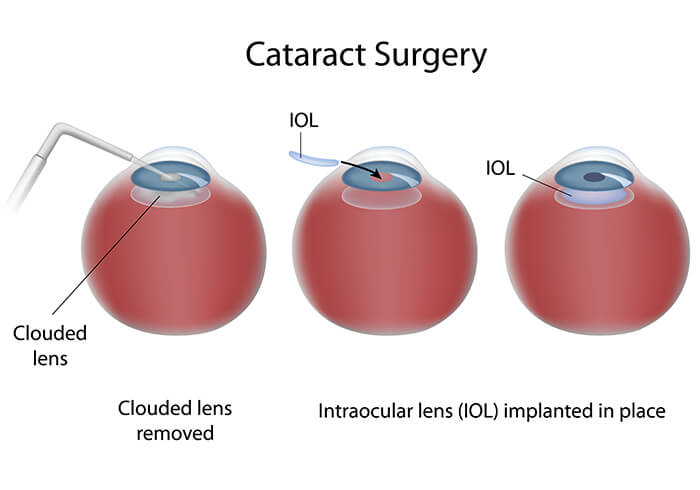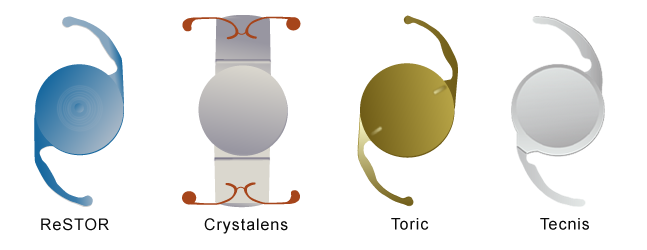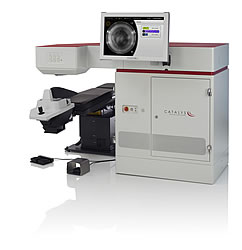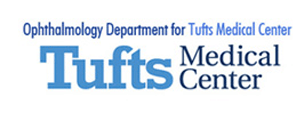Cataract Surgery Boston, MA
This lens of the eye lies behind the iris and the pupil and works to focus light onto the retina, which is located at the back of the eye. The lens also adjusts the eye’s focus, allowing us to see objects at all distances. Sometimes, as we age, protein from our eye’s lens clumps together and clouds the lens. This is called a cataract, and it can greatly impair a person’s ability to see.
For over 50 years, surgeons have been treating cataracts by surgically replacing clouded lenses. Today, cataract surgery is considered one of the safest and most effective procedures in medicine.
If you have noticed that your vision seems blurred or hazy, the light seems glaring, or colors seem duller than usual, you may have a cataract. Please contact our practice so we can evaluate your vision and determine if cataract surgery is right for you.

Cataracts FAQ’s
What is the Cost of Cataract Surgery?
The cost of cataract surgery will vary based on the type of procedure you choose, as well as the intraocular lens that fits your needs. Additionally, cataract surgery is covered by both private and Medicare insurance and will impact the out-of-pocket expenses.
Crystalens® vs. Fixed IOLs
The crystalens® is unique because it is the first FDA approved accommodating IOL in the United States. It was designed to mimic the eye's natural way of focusing in order to allow patients to see clearly at all distances. Unlike the crystalens®, the design of standard, fixed IOLs prevents them from moving to focus (accommodating). Therefore, patients who receive fixed IOLs remain dependent on glasses to see items close up.

Possible Risks/Side Effects
Though the Crystalens® is very safe, all surgery involves some degree of risk.
The following are possible risks and side effects that may be caused by undergoing this procedure:
- Rare sight-threatening complications include infection, hemorrhage, and retinal detachment
- Some patients experience temporary light sensitivity following surgery
- Following cataract surgery, some patients experience minor night vision problems, such as glare
General Considerations
- Most patients with good general health are candidates for Crystalens® implantation. However, those with chronic infections, uncontrolled diabetes, or other health problems may not be suitable for the surgery.
- Patients who have had prior refractive surgery can still receive the Crystalens®.
- Patients who have already had cataract surgery are not candidates for the Crystalens® procedure.
- Seniors undergoing Crystalens® treatment can now receive standard cataract surgery reimbursement.
Before you undergo Crystalens® implantation, your surgeon will thoroughly evaluate your vision and overall health to determine if it is right for you. To learn more about the revolutionary crystalens® procedure, contact our Boston practice today.
Click here to take the Premium Lens Self Test.
Rejuvenate Your Eyes, Regain Your Independence
Cataract Surgery Boston
As you age, your whole body goes through drastic changes, and unfortunately, your eyes are no exception. The natural lenses of our eyes are responsible for capturing an image, focusing it on the retina, and sending it to the brain.
Over time, the proteins in these lenses clump together, causing a clouding known as cataracts. The cataract surgery we provide at New England Eye Center of Boston reverses the negative effects of cataracts by removing the natural lens and replacing it with an artificial one that can dramatically improve the quality of your vision.
If you suffer from cataracts and are ready to take the first step towards regaining your visual independence, contact New England Eye Center today to schedule your first consultation.
Enjoy the Benefits of Clear Vision
Cataract surgery is the only effective solution to cataracts, as there is no laser surgery or contact lens that can reverse their effects. Prior to cataract surgery, you may feel pressure to give up driving, but once you undergo cataract surgery, the chances are high that you will regain your independence and begin driving again, making it more feasible to attend social events, get to and from work, and travel.
Our Boston patients who have undergone cataract surgery have noticed an improvement in the clarity, depth, and color of their vision and have felt more comfortable differentiating between contrasting light. Cataract surgery provides a great number of benefits, including many that can make driving far safer.
After you undergo the procedure, you can expect to experience:
- Improved reaction time
- The better judgment of speed and distance of approaching vehicles
- Improved ability to detect and identify obstacles
- Better differentiation between foreground and background
- Reduced sensitivity to glare
Understanding the Procedure
Cataract surgery performed by our Boston doctors takes about an hour and can involve one of two different techniques.
The ultrasonic probe technique uses a very small probe that emits ultrasound waves to break up the natural lens. Using this phacoemulsification technique, your doctor will use a suctioning tool to extract the fragments of your lens through a tiny incision in the front of your eye. This procedure may require stitches to close the tiny incision, but specific treatment details will be discussed before surgery.
The extracapsular cataract extraction technique involves making a larger incision through which your lens will be removed as a whole. Both of these techniques are completed with the implantation of an artificial lens, or IOL, which becomes a permanent part of your eye.
Safety Matters
Ninety-eight percent of all cataract surgery procedures performed every year are completed without any major complications. This surgery is incredibly safe, and when combined with our doctors' valuable expertise and experience, we can make your procedure at New England Eye Center stress-free.
Learn More about Cataract Surgery
Improving your vision with cataract surgery can be a life-altering change, and our team of doctors and office staff has the tools and knowledge necessary to make your experience with us easy and comfortable. Our state-of-the-art facility is equipped to provide you with the most advanced eye care in order to keep your eyes as healthy as possible. If you would like more information about cataract surgery or are interested in scheduling your first appointment, please contact our office today.
New England Eye Center Now Offers Laser Cataract Surgery with CATALYS™
If you have ever wondered if you have a cataract or when you will acquire a cataract, you are not alone. According to the World Health Organization, cataracts are the leading cause of blindness in the world. Cataracts are slightly more common in women than in men and can occur at any age. Realistically, if you live long enough, you will get a cataract.

The good news is that cataract surgery is the most frequently performed surgery within the United States. And while it is not without risk, advancements in technology combined with the experience of our Board Certified Cornea Surgeons allow the majority of people to regain very good vision somewhere between 20/20 and 20/40.
The even better news is that with the FDA approved advanced lens technology available in Boston, patients have vision correction options that can reduce or eliminate the need for glasses after cataract surgery. The refractive surgeons at New England Eye Center have been leaders in the community, offering many types of advanced or premium lenses</a > since their inception.
Patients who choose the option to upgrade to premium lens surgery, versus traditional cataract surgery, continue on to enjoy their daily activities with a high degree of visual satisfaction. The premium lenses allow the doctors at New England Eye Center to offer patients the ability to see near, far, and in between. Today, FDA approved premium IOL’s are routinely implanted with excellent results.
In our effort to continue to provide our patients' options with the most recent advancements in vision correction technology, New England Eye Center is thrilled to offer patients access to the new standard in precision cataract surgery with the CATALYS™ Precision Laser System. Using CATALYS, our physicians can provide a gentle, precise, and highly customized cataract procedure with accuracy not achievable using traditional manual techniques.
What is CATALYS?
Developed by Silicon Valley-based OptiMedica Corp., CATALYS is an advanced FDA market cleared medical device that features a state-of-the-art laser, advanced 3D imaging, and many other innovative features that can bring numerous benefits to New England Eye Center patients.
How does it work and what are the steps?
Every eye has a unique size and shape. CATALYS’ advanced 3D imaging technology builds a 3D map of each eye and tailors the treatment to that map. This enables our surgeons to create a customized treatment plan that matches the uniqueness of each eye.
Dr. Helen Wu and Dr. Dan Hu use CATALYS to create a circular opening for accessing and removing the cataract. Clinical studies have shown that this opening is approximately 10 times more accurate when performed with CATALYS than what is achievable by hand [1,2]. The physicians utilize CATALYS to then soften and break up the hard cataract into tiny pieces, allowing for a gentler, easier cataract removal[3]. Just as in the traditional cataract removal technique, these steps set the stage for positioning of the replacement lens.
However, positioning of the lens is especially important with the high technology lenses our facility offers. Premium lenses demand a level of precision, accuracy, and customization that traditional manual surgery struggles to provide. The Catalys Femtosecond Laser combined with the advanced lens technology now available allows the physicians at New England Eye Center to offer Boston patients a precisely customized cataract procedure from start to finish.
What are the benefits of CATALYS for the patient and the physician?
- Catalys offers patients and physicians a gentler and easier cataract removal
- Catalys provides precision and accuracy that is approximately ten times greater than that achieved with manual techniques
- Catalys will offer New England Eye Center Patients the experience of a fast but precise procedure with little or no discomfort
- Catalys will allow the physicians to customize the procedure with advanced 3D imaging
To see your world more clearly after cataract surgery, contact us now to learn more about precision cataract surgery with CATALYS. As you age, your whole body goes through drastic changes, and unfortunately, your eyes are no exception. The natural lenses of our eyes are responsible for capturing an image, focusing it on the retina, and sending it to the brain. Over time, the proteins in these lenses clump together, causing a clouding known as cataracts.
The cataract surgery we provide at New England Eye Center of Boston reverses the negative effects of cataracts by removing the natural lens and replacing it with an artificial one that can dramatically improve the quality of your vision. If you suffer from cataracts and are ready to take the first step towards regaining your visual independence, contact New England Eye Center today to schedule your first consultation.
References
- Friedman, NJ, et al., “Femtosecond Laser Capsulotomy,” Journal of Cataract & Refractive Surgery, 2011 July; 37(7): 1189-1198
- Palanker, D., et al., “Femtosecond Laser-Assisted Cataract Surgery with Integrated Optical Coherence Tomography,” Science Translational Medicine, Vol 2 Issue 58: 1-9 (2010)
- Burkhard HD., “The synergy of MICS and femtosecond lasers: The future of small incision cataract surgery” Ophthalmology Times Europe, 2012 April; Vol 8 Issue 3




